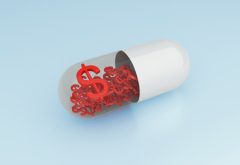CCHR asks for parents to come forward about sons who may be suffering a serious, antipsychotic drug side effect: growth of female breasts.
 Citizens Commission on Human Rights (CCHR) Australia has launched a nationwide campaign reaching out to parents of boys that may be victims of the antipsychotic drug, Risperdal (risperidone) and suffering from gynaecomastia, a condition where boys grow female breasts. Risperdal may increase the amount of a hormone (prolactin) in blood that can cause a disturbing growth of breasts, requiring a mastectomy to remove them.1 CCHR Australia’s National President Shelley Wilkins said there are several actions the group is doing, aimed at protecting boys from being harmed by the drug and to demand greater warnings about the drugs.
Citizens Commission on Human Rights (CCHR) Australia has launched a nationwide campaign reaching out to parents of boys that may be victims of the antipsychotic drug, Risperdal (risperidone) and suffering from gynaecomastia, a condition where boys grow female breasts. Risperdal may increase the amount of a hormone (prolactin) in blood that can cause a disturbing growth of breasts, requiring a mastectomy to remove them.1 CCHR Australia’s National President Shelley Wilkins said there are several actions the group is doing, aimed at protecting boys from being harmed by the drug and to demand greater warnings about the drugs.
In February a Pennsylvania State jury in the U.S. awarded U.S$2.5 million to the family of a man who as a child was prescribed Risperdal for five years to treat autism and developed gynaecomastia. The Wall Street Journal reported the boy grew size 46 DD breasts.2 There are a further 1200 lawsuits against the manufacturer, Johnson and Johnson (and Janssen) in the United States. Steven Sheller of Sheller P.C. in Philadelphia said the trial was the first in which testimony was heard about internal company data showing that patients with abnormal levels of prolactin at eight to 12 weeks, are the most likely to suffer gynaecomastia from Risperdal.3 “There was grave mistreatment of children,” said Sheller.4
In Australia:
- 13,655 children under the age of 16 are prescribed antipsychotics.5
- An extraordinary 75.23% of the 2-16 year olds taking antipsychotics in 2012/13 were prescribed risperidone.6
- Of the 1,106 children aged 2-6 years on an antipsychotic, 1,010 (91.3%) are on risperidone.7
- There were 595 deaths linked to antipsychotics in Australia for all ages by June 2012/13, 15 were children aged 0-9 (including intrauterine deaths). Of the total deaths reported, 42 were for risperidone. Risperidone is the third highest prescribed antipsychotic on the Pharmaceutical Benefits Scheme.8
- In overseas clinical trials of 1,885 children and adolescents, gynaecomastia was reported in 2.3% of Risperdal-taking patients, according to U.S. Food and Drug Administration information sheet on the drug.9 Potentially, hundreds of children in Australia could be at risk of developing gynaecomastia and the trauma that this could cause.
- Those numbers could be much higher in light of a study published in the Journal of Clinical Psychopharmacology last year that investigated the histories of 8,000 men with gynaecomastia. The researchers determined that males who take Risperdal are up to 69% percent more likely to develop gynaecomastia and that the risk is 40% greater with Risperdal than with competitive antipsychotics.10
Ms Wilkins said actions that the group is taking include:
- Informing parents of the risks so that they can take legal action as necessary, including against prescribing psychiatrists that ignored the gynaecomastia risk.
- CCHR has requested the Federal and State Health Ministers and Heads of the Health Departments to investigate the paediatric use of Risperdal/risperidone in any psychiatric facility, university and other research centres (including Orygen youth mental health centres, Headspace centres, EPPIC that receive federal funds, including research grants.
- On the headspace & Orygen website is a “Quick Reference Evidence Map” which recommends antipsychotics, including risperidone, for “Ultra High Risk Psychosis” as the drug intervention if there is deterioration accompanied by psychotic-like symptoms.11 A Freedom of Information Request obtained by CCHR show that researchers at the NSW Brain and Mind Research Institute and Orygen state that headspace are “becoming clinical laboratories for applied research.”
- CCHR has written to the Therapeutic Goods Administration requesting a prominent warning be added to Risperdal, risperidone, generic versions of the drug and other antipsychotics about the risk gynaecomastia, with an explanation about lawsuits against the drug in the U.S. The TGA should also write to all doctors asking them to report this and other serious adverse events in patients taking these drugs. In June 2010, the TGA’s Public Assessment Report for risperidone references gynaecomastia as an adverse effect but the warning is grossly inadequate.12
Former Food and Drug Administration (FDA) commissioner David Kessler served as a paid expert witness for the family in the Philadelphia lawsuit and testified that Johnson & Johnson (with its subsidiary, Janssen) knew about the risks associated with Risperdal, but failed to disclose the data showing the extent to which youngsters may develop gynaecomastia.13
We’ve already seen the international mental health expert outcry over Professor Patrick McGorry’s use of Risperdal and/or other antipsychotics for youths “at risk” of developing psychosis.
 Janssen funded an early study Prof. McGorry conducted (1996) using Risperdal.14 And his double-blind randomised placebo-controlled study published in the Journal of Clinical Psychiatry in 2012 involving risperidone and cognitive behaviour therapy, cognitive therapy plus placebo or supportive therapy plus placebo was also supported and funded by Janssen. Four of the researchers, including Prof. McGorry, had potential conflicts of interest with Janssen and other pharmaceutical companies. Ten researchers, including Prof. McGorry were affiliated with Orygen Health Research Centre for Youth Mental Health.15
Janssen funded an early study Prof. McGorry conducted (1996) using Risperdal.14 And his double-blind randomised placebo-controlled study published in the Journal of Clinical Psychiatry in 2012 involving risperidone and cognitive behaviour therapy, cognitive therapy plus placebo or supportive therapy plus placebo was also supported and funded by Janssen. Four of the researchers, including Prof. McGorry, had potential conflicts of interest with Janssen and other pharmaceutical companies. Ten researchers, including Prof. McGorry were affiliated with Orygen Health Research Centre for Youth Mental Health.15
Substantial taxpayer dollars are given organizations such as headspace and Orygen, deserving assurances that children are not being put at risk of gynaecomastia, diabetes and other debilitating side effects. Conflicts of interest which may be contributing to high rates of children and adolescents being prescribed Risperdal/risperidone and other antipsychotics should be part of any investigation.
- http://sheller.com/Risperdal/
- “Johnson & Johnson Loses Trial over Risperdal and Male Breasts,” The Wall Street Journal blog, 24 Feb 2015, http://blogs.wsj.com/pharmalot/2015/02/24/johnson-johnson-loses-trial-over-risperdal-and-male-breasts/
- http://www.lexisnexis.com/legalnewsroom/litigation/b/litigation-blog/archive/2015/02/24/pennsylvania-state-court-jury-awards-2-5-million-in-risperdal-gynecomastia-trial.aspx
- “Johnson & Johnson Loses Trial over Risperdal and Male Breasts,” The Wall Street Journal blog, 24 Feb 2015, http://blogs.wsj.com/pharmalot/2015/02/24/johnson-johnson-loses-trial-over-risperdal-and-male-breasts/
- “Report 3 A for antipsychotics, Number of unique patients by age group, state for requested antipsychotic items supplied from 1 July 2012 to 30 June 2013, patient age as at 30 June 2013,” Strategic Information Division, Information Services Branch, Health Compliance Section, Department of Human Services.
- “Report 3 A for antipsychotics, Number of unique patients by age group, state for requested antipsychotic items supplied from 1 July 2012 to 30 June 2013, patient age as at 30 June 2013,” Strategic Information Division, Information Services Branch, Health Compliance Section, Department of Human Services.
- “Report 3 A for antipsychotics, Number of unique patients by age group, state for requested antipsychotic items supplied from 1 July 2012 to 30 June 2013, patient age as at 30 June 2013,” Strategic Information Division, Information Services Branch, Health Compliance Section, Department of Human Services.
- “Medicine summary- antipsychotics (to end January 2009) 0-9 year olds, Cube updated 15/12/2009 7:30:39 Am, provided to CCHR by Therapeutic Goods Administration ; “Medicine summary- antipsychotics (to end January 2009) 10-19 year olds, Cube updated 15/12/2009 7:30:39 AM, provided to CCHR by Therapeutic Goods Administration; Report generated on TGA website using Data Base of Adverse Events for all the different brands of risperidone (10), between 01/01/1971 -30/06/2013, report generated on 9/02/15 on: www.tga.gov.au
- “Highlights of Prescribing Information, Risperdal (risperidone),” http://www.accessdata.fda.gov/drugsatfda_docs/label/2009/020272s056,020588s044,021346s033,021444s03lbl.pdf
- http://www.gynecomastialawsuitattorney.com/blog/gynecomastia-risk-higher-with-risperdal/
- “The Australian Clinical Guidelines for Early Psychosis, 2nd Edition, Evidence Map Quick Reference,” headspace & Orygen Youth Health.
- “Australian Public Assessment Report for Risperidone”, Australian Government, Department of Health and Ageing, Therapeutic Goods Administration, June 2010 p. 57.
- “Johnson & Johnson Loses Trial over Risperdal and Male Breasts,” The Wall Street Journal blog, 24 Feb 2015, http://blogs.wsj.com/pharmalot/2015/02/24/johnson-johnson-loses-trial-over-risperdal-and-male-breasts/
- Alison R Yung, Patrick D McGorry, Shona M Francey, Barnaby Nelson, Kathyryn Baker, Lisa J Philips, Gergor Berger & G Paul Ammiger, “PACE: a specialised service for your people at risk of psychotic disorders,” MJA, Volume 187, Number 7, 1 October 2007.
- Patrick D. McGorry MD, PhD; Barnaby Nelson, PhD; Lisa J Philips, PhD; Hok Pan Yuen, MSc; Shona M. Francey,PhD; Annette Thampi, MRCPsych’ Grogor E.Berger, MD; G. Paul Amminger, MD; Magenta B.Simmons, BA; Daniel Kelly Grad Dip (Psych); Andrew D. Thompson, MD; and Alison R. Yung, MD, “Randomized Controlled Trial of Interventions for Young People at Ultra –High Risk of Psychosis: Twelve-Month Outcome,” Journal of Clinical Psychiatry, 74:4, April 2013.